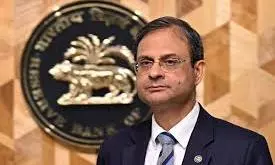AA Edit | RBI takes prudent action amid global uncertainties
With the latest 25 basis point rate cut, the repo rate now stands at six per cent, which is two percentage points higher than the historic low witnessed in 2020 during the Covid-19 pandemic;

The RBI-led Monetary Policy Committee’s decision to slash the repo rate and shift its monetary stance from neutral to accommodative is a prudent move in light of current global economic uncertainties.
With the latest 25 basis point rate cut, the repo rate now stands at six per cent, which is two percentage points higher than the historic low witnessed in 2020 during the Covid-19 pandemic. This measure is intended to stimulate domestic demand at a time when the global economic outlook is increasingly fragile.
Although RBI governor Sanjay Malhotra refrained from speculating about future moves, the ongoing clash between the world’s two largest economies the United States and China, which together account for 42 per cent of the global economy, will likely have spillover effects on emerging markets like India, unless US President Donald Trump allows a favourable trade deal with India.
In such an economic climate, the RBI's accommodative stance is not only appropriate but also necessary to boost domestic consumption and investment. Another rate cut in the upcoming June policy meeting remains a possibility, especially if global conditions continue to deteriorate.
Retail inflation, which stood at 3.61 per cent in February — below the RBI’s comfort level — has enabled the Central bank to adopt an accommodative monetary stance to support economic growth. An anticipated global slowdown, fuelled by tit-for-tat tariffs imposed by the United States and China, along with lower crude oil prices, is expected to keep inflation benign. The RBI remains confident that inflation will align with its target of four per cent over the next year.
The Central bank has also acknowledged heightened uncertainty across regions, which poses new headwinds for global growth and inflation. Nevertheless, it remains hopeful about the potential positive impact of policy measures adopted by the government, including the proposed foreign trade agreements with the United States, United Kingdom, and the European Union. However, the RBI has modestly lowered its GDP growth projection by 20 basis points, from 6.7 per cent to 6.5 per cent for the current financial year.
Following the RBI policy meeting, global developments have escalated: the US has imposed a staggering 145 per cent tariff on Chinese goods, prompting Beijing to retaliate with a 125 per cent duty on US products. China has also reached out to other nations in an attempt to launch a coordinated response against the Trump administration’s tariffs. The trade war between the US and China thus appears to have reached a point of no return.
Meanwhile, a surge in the yield on US Treasury bonds — which are considered the safest assets in the world — underscores growing anxiety among global investors. Some analysts believe that hedge funds are raising cash to offset stock market losses, while others speculate that China may be offloading US Treasuries in a bid to raise American borrowing costs and exert pressure on the Trump administration.
Despite being the world’s fifth largest economy, India remains a relatively modest player, contributing just 7.93 per cent to the global economy and 4.4 per cent to global trade. Its ability to influence global developments is limited. As the RBI governor rightly noted, many unknowns remain. For India, therefore, future growth will largely depend on securing favourable trade terms with major Western economies such as the US, UK, and the EU.

